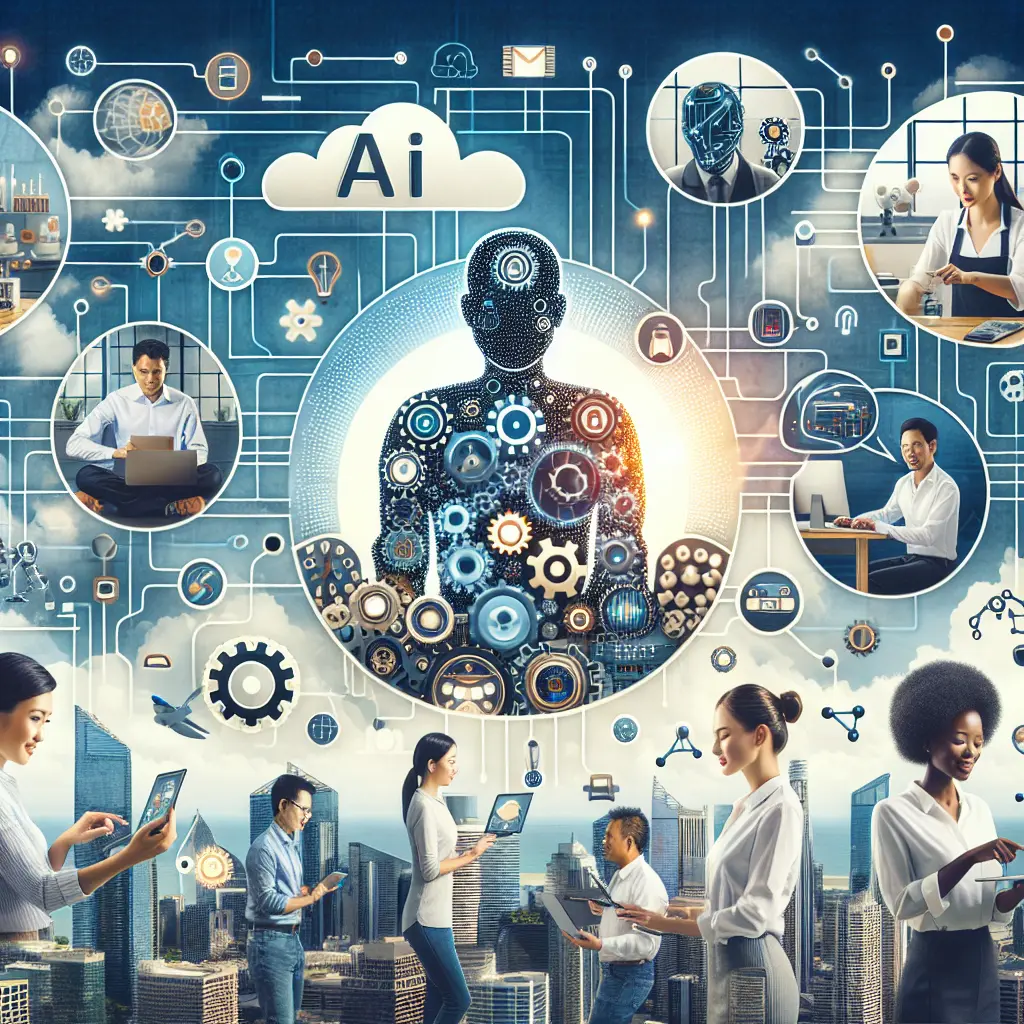
Artificial Intelligence: A Catalyst for Career Transformation
In the rapidly evolving landscape of the 21st century, artificial intelligence (AI) is not just a technological advancement but a transformative force reshaping the global job market. As AI permeates various sectors, it ushers in a new era of career opportunities that were unimaginable a few decades ago. The AI job market is witnessing an unprecedented surge, offering a plethora of careers that cater to diverse skill sets and professional backgrounds.
AI's impact on employment is multifaceted, sparking both the creation of new jobs and the transformation of existing roles. This AI-driven career revolution is redefining traditional job profiles, requiring an adaptive workforce ready to embrace change. As organizations recognize AI's potential to optimize operations and drive innovation, the demand for AI skills is escalating, giving rise to a new wave of professional roles.
The Dawn of AI-Driven Careers
The AI job market is experiencing remarkable growth, offering diverse and dynamic career opportunities that reshape traditional employment paradigms. According to a recent Forbes report, there has been a significant uptick in demand for AI professionals, with roles ranging from data scientists to machine learning engineers. This surge is fueled by organizations seeking to harness AI's potential to optimize operations and spur innovation.
While the benefits of AI in employment are clear, concerns about job displacement persist. However, as noted by McKinsey & Company, AI-driven careers are expanding the job market by blending human ingenuity with machine efficiency, fostering a collaborative future.
The Reality of Universal Basic Income in an AI-Dominated World
The discussion around Universal Basic Income (UBI) has gained traction as AI continues to transform job landscapes. Proponents argue that UBI could mitigate economic displacement caused by AI. However, critics question its feasibility and sustainability. A study by the Brookings Institution highlights that while UBI offers a safety net, it may not fully address complexities introduced by AI employment trends.
The reality is that while AI creates new jobs, it also demands upskilling and reskilling initiatives to prepare workers for these roles. The demand for AI skills underscores the need for educational reforms and lifelong learning programs to ensure a workforce ready for future scenarios.
Navigating a Saturated AI Startup Market
The proliferation of AI startups has led to an oversaturated market where differentiation is key to survival. Companies like OpenAI and DeepMind have carved niches by focusing on specialized solutions. However, as reported by TechCrunch, many startups face challenges standing out amidst fierce competition.
For aspiring entrepreneurs, understanding these market dynamics is crucial. The AI industry's growth isn't just about technological innovation but also strategic positioning and finding unique value propositions that cater to specific industry needs.
Client Disillusionment: The Gap Between Big Tech Promises and Real-World Applications
Despite the hype surrounding AI tools from big tech companies, some clients remain unimpressed. A survey by Gartner reveals excitement around AI's potential often falls short in practical applications. This discrepancy highlights the importance of aligning solutions with actual business needs and capabilities.
This situation presents new opportunities for AI professionals focused on bridging the gap between development and practical implementation in business contexts. These roles emphasize understanding both technical aspects and business strategies.
Regulatory Challenges and Opportunities in the EU
AI's integration into global markets faces regulatory hurdles, particularly within the European Union. Recent actions by companies like Meta, which limit AI releases due to regulatory concerns as discussed by The Verge, illustrate the complex landscape tech firms must navigate.
These challenges also create opportunities for professional roles centered on compliance and ethical development. As regulations evolve, so too will the demand for experts who ensure technologies adhere to legal standards while promoting innovation.
Venture Capital's Evolving Landscape
The venture capital (VC) industry plays a critical role in funding AI startups. However, recent trends show VCs becoming more cautious due to saturated markets and unmet expectations, as highlighted by Crunchbase News. This shift prompts investors to seek companies with robust, scalable business models that can withstand economic fluctuations.
For those involved in industry growth, understanding VC dynamics is essential for securing funding and ensuring long-term viability. The focus increasingly shifts towards sustainable innovation rather than rapid expansion.
The Role of EdTech in Upskilling for AI Careers
As AI reshapes jobs, education technology (EdTech) firms like Coursera are pivotal in providing accessible upskilling opportunities. By incorporating generative AI into their platforms, these companies enable learners to acquire necessary skills at their own pace.
This advancement highlights the growing need for continuous learning in adapting to new career paths within the job creation sector. It also emphasizes educational institutions aligning curricula with industry requirements to produce graduates ready for emerging roles.
Addressing Urban and Economic Impacts
While city economies thrive, challenges such as potential commercial real-estate downturns loom large, as discussed in The Atlantic. These economic shifts require innovative solutions where AI can play a significant role in urban planning and management.
AI's ability to analyze large datasets helps predict economic trends and propose sustainable urban development strategies. This creates additional careers focused on urban analytics and smart city initiatives.
Conclusion
The transformative power of artificial intelligence in shaping new career opportunities is undeniable. As we navigate this evolving landscape, embracing both challenges and opportunities presented by this technological revolution is crucial. By fostering an adaptable workforce through targeted education and regulatory frameworks, we ensure AI acts as an enabler of human potential, driving forward a collaborative and innovative future of work.
The path forward requires embracing technological advancements while addressing societal impacts such as economic displacement and regulatory challenges. Through strategic planning and continuous learning, individuals and organizations can thrive in this new era of job transformation.
I invite you to reflect on how AI might transform your career or industry. Share your experiences and insights in the comments below, and let's explore this fascinating journey together.
Author: Clara Fitzgerald